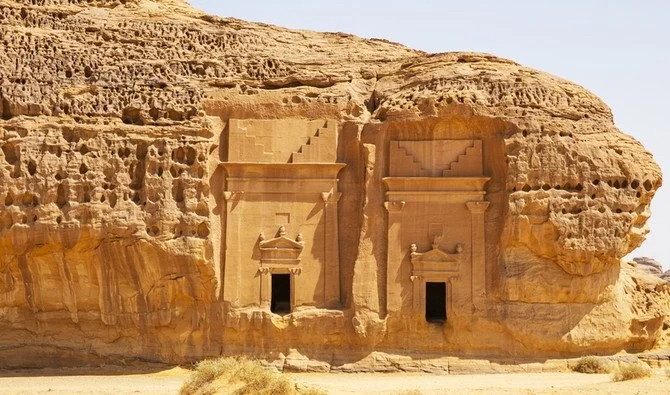
- ARAB NEWS
- 15 Jul 2025

Although Saudi Arabia is home to some of the world’s most historically significant Islamic sites, international tourists have yet to add visiting the Kingdom to their bucket lists.
For decades, the Saudi economy has remained heavily reliant on oil, so much so that it has dominated the nation’s reputation. However, over the past few years, through its Vision 2030 reforms, the new Saudi government has been actively diversifying its economy. One such diversification is building a tourism sector, a notion unthinkable even a decade ago.
Historically, travelers have only been permitted entry to the Kingdom to conduct business, visit family, or perform Hajj or Umrah. However, to meet its targets, the Kingdom needs to increase its foreign tourists to 55 million by 2030. This goal has led to the introduction of tourist visas and ushered in a new era where international tourism is encouraged.
The question posed by economists has been, can the Kingdom turn its tourism potential into a sound economic sector, or will it have to rely entirely on more Hajj and Umrah visitors? More specifically, what can the Kingdom offer foreign tourists to get them to choose it over other destinations?
The only viable answer to this question is Islamic history.
To land in the Top 10 list of the world’s most visited nations, a country must have unique desirable assets, or offer an experience far more entertaining than other destinations.
The latter would be tough to create in the Kingdom without negatively impacting local customs and culture. However, the Kingdom can offer a unique desirable asset: Authentic Islamic historic sites. The Kingdom is endowed with a rich selection of historically significant Islamic sites yet to be developed. These sites are not only desirable nationally, but because of their significance to Islamic history they are significant globally.
Leaning into Islamic heritage as the bedrock of Saudi tourism would allow the Kingdom to further deliver its raison d’etre by offering Muslims worldwide more ways to experience their religion, as well as creating an opportunity for the Muslim world to share its rich Islamic culture and history with non-Muslims around the globe.
Building a socio-economically booming tourism sector is far more complex and much less direct than building a business. Therefore, economic success will not be driven by the profitability of individual sites but by a wide range of connected sectors and businesses that contribute to the tourism sector and, together, create jobs and increase gross domestic product.
The Kingdom has a new and unique offering that could put its economy on the verge of structural change. With the right approach, it could shift the world’s overall perception of not only the Kingdom, but of Islamic history.
Amira El-Adawi
Experience and studies have shown that the authenticity of heritage sites significantly affects the economic value they create. Manufactured history and commercialized heritage are no longer enough for savvy tourists who have a lot of choices about where to spend their time and money.
Tourists are clear about what they want, and they vote with their wallets. They want the real thing, and a host country can find great economic value in fulfilling those wants.
The right approach for these religious sites is to view them as “anchor products” that can attract diverse visitors and use their draw to build a structurally sound sector that lifts tourism GDP and develops auxiliary sectors that serve and support the tourism industry.
This does not mean that it will be easy to create authentic heritage sites that are desirable enough to act as anchor products. That strategy will need targeted efforts, and the conviction to resist the temptations of easy solutions. The key to successfully developing anchor heritage sites is ensuring they remain as authentic and noncommercial as possible. It needs a delicate balancing act to preserve these sites in their original historical state, and engulf them in spiritual concepts that give them the reverence and respect they deserve, while still building the comfortable, luxurious infrastructure needed to support them.
That also means resisting the temptation to turn these sites into retail, dining and entertainment centers. Despite the buzz and investor interest that luxury hotels and shopping malls can create, the benefits are short-lived and not where the Kingdom’s competitive edge lies. In the long run, lasting benefits come from creating a structurally sound economic sector based on authentic heritage that tourists will want to experience for years to come.
Saudi leaders have always viewed themselves as guardians of the Islamic holy sites. Now, they need to expand that definition to include the entirety of the Kingdom’s Islamic heritage sites, protecting them for future generations while keeping their eye on the longer-term prize.
The Kingdom’s tourism goals are ambitious; delivering 100 million jobs and at least 10 percent of GDP within a decade is no easy task. So far, the struggle has been to identify what would draw international tourists to the Kingdom.
That skepticism fails to consider the potential draw of an authentic experience built around Islamic history that is spiritual and informative, yet engaging and enjoyable. This potential could be the proverbial lynchpin of the tourism segment within Vision 2030.
In Islamic heritage, the Kingdom has a new and unique offering that could put its economy on the verge of structural change. With the right approach, it could achieve or even exceed its ambitious goals and shift the world’s overall perception of not only the Kingdom, but of Islamic history.